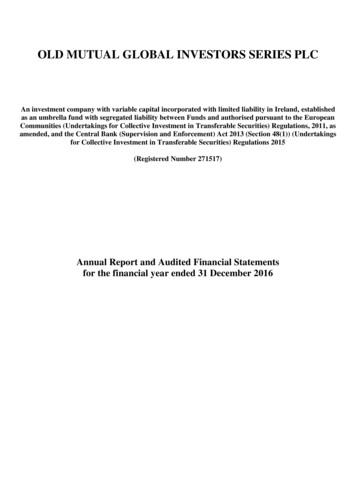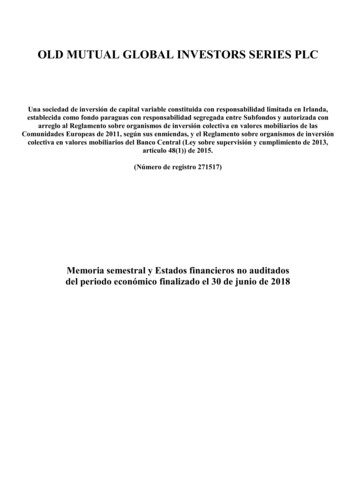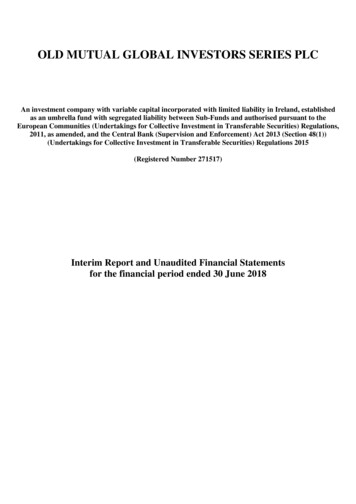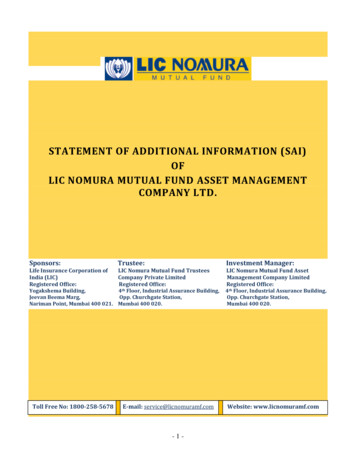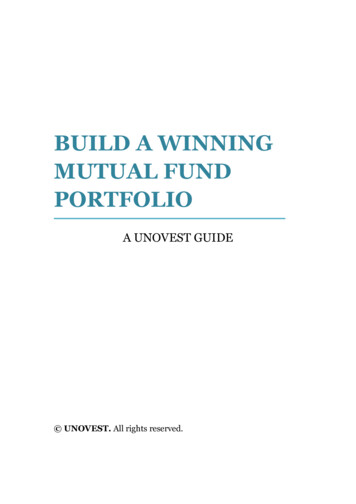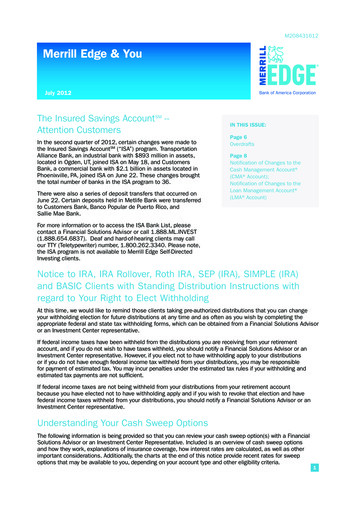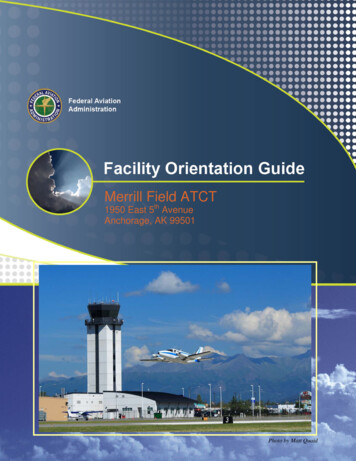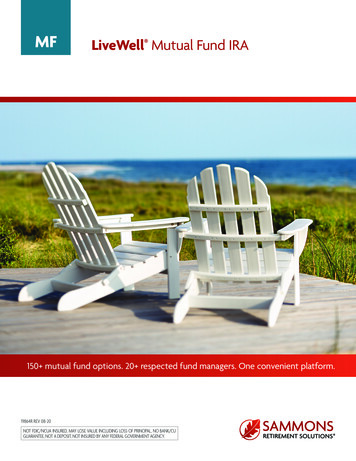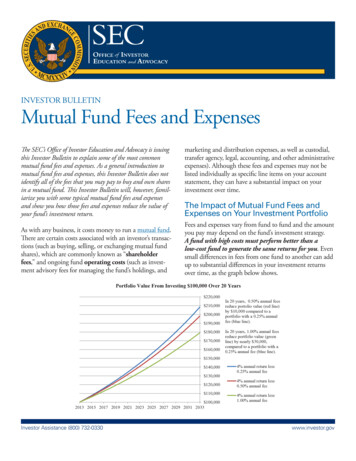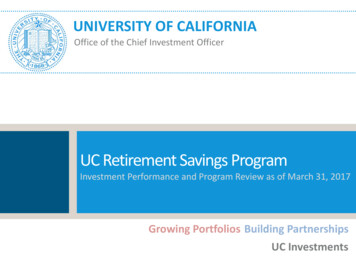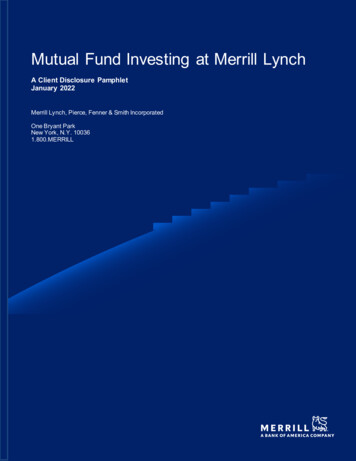
Transcription
Merrill Personal Advisor PrograClient AgreementMutual Fund Investing at Merrill LynchA Client Disclosure PamphletJanuary 2022Merrill Lynch, Pierce, Fenner & Smith IncorporatedOne Bryant ParkNew York, N.Y. 100361.800.MERRILL1Code 311619PM-0210
Mutual Fund Investing at Merrill LynchTable of ContentsIntroduction2-3U.S. Registered Mutual Fund Share Classes3-7Front-End Sales Charge and Contingent Deferred Sales Charge (CDSC) Waiversand Discounts at Merrill Lynch7-8Asset-Based Fee Programs8-99Retirement & Benefit Plan Services Programs9-10Merrill Edge Self-Directed Investing10-11Compensation of Merrill Lynch Financial Advisors and Their Managers11Compensation for Financial Solutions Advisors and Certain Other AdvisorsFund Families’ Cost Sharing for Training Events and Other Meetings & Gifts, Meals andEntertainment11-12Additional Merrill Lynch Services and Compensation12-14Money Market Mutual Funds14-1616Purchases, Sales and Transfers16-17Other Services18AppendixMutual Funds are not FDIC insured; are not deposits or obligations of, or guaranteed by, any financial institution; and are subject toinvestment risks, including possible loss of the principal amount invested. Investment return and principal value will fluctuate so that aninvestor’s shares, when redeemed, may be worth more or less than their original cost.Prospectuses for mutual funds can be obtained through the investor’s sign-in area of merrilledge.com. Clients of Merrill Advisory Centercan also call 1.888.654.6837. If you’re not currently a Merrill Edge client, please call 1.888.637.3343.Merrill Lynch, Pierce, Fenner & Smith Incorporated (also referred to as “MLPF&S” or “Merrill”) makes available certain investmentproducts sponsored, managed, distributed or provided by companies that are affiliates of Bank of America Corporation (“BofA Corp.”).MLPF&S is a registered broker-dealer, registered investment adviser, Member SIPC and a wholly owned subsidiary of BofA Corp.Investment products:Are Not FDIC InsuredAre Not Bank GuaranteedMay Lose ValueMerrill Lynch is providing this third-party website only as a convenience and the inclusion of the website does not imply anyendorsement, approval, investigation, verification or monitoring by Merrill Lynch or any of its affiliates of any content or informationcontained within or accessible from the website. Merrill Lynch and its affiliates do not control the accuracy, completeness,timeliness or appropriateness of the content or information on the website. If you choose to visit the website you will be subject toits terms of use and privacy policies, over which Merrill Lynch and its affiliates have no control. In no event will Merrill Lynch or anyof its affiliates be responsible for any information or content within the website or your use of the website.The Chief Investment Office (CIO) provides thought leadership on wealth management, investment strategy and global markets;portfolio management solutions; due diligence; and solutions oversight and data analytics. CIO viewpoints are developed for Bankof America Private Bank, a division of Bank of America, N.A., (“Bank of America”) and Merrill Lynch, Pierce, Fenner & SmithIncorporated (“MLPF&S” or “Merrill”), a registered broker-dealer, registered investment adviser and a wholly owned subsidiary ofBofA Corp. This information should not be construed as investment advice and is subject to change. It is provided for informationalpurposes only and is not intended to be either a specific offer by Bank of America, Merrill or any affiliate to sell or provide, or aspecific invitation for a consumer to apply for, any particular retail financial product or service that may be available. 2016 Bank of America Corporation. All rights reserved.1ARXXXXXX351205PM-0417 2021 Bank of America Corporation. All rights reserved.
Mutual Fund Investing at Merrill LynchDisclosure Statement (Continued)Introductionfunds or share classes directly from the mutualfund company or its distributor, or through otherfinancial intermediaries, without paying a fee orsales charge to Merrill Lynch or for lower fees andexpenses. Further, some mutual funds haveinvestment strategies that can be substantiallysimilar to the strategies of other investmentproducts, such as exchange traded funds andseparately managed accounts. These investmentproducts can have lower costs and expenses buthave different features than those offered bymutual funds (e.g., exchangeability, certaindiscounts and waivers, or daily net asset value). AMerrill Lynch Financial Advisor’s compensationvaries based on the type of investment product,therefore a Merrill Lynch Financial Advisor canreceive more or less compensation if you invest ina mutual fund over another investment product.When selecting a mutual fund that fits your needs,there are several key factors to consider: The fund’s investment strategyThe fund’s risk profileThe fund’s investment performanceThe fund’s relationship to your overallasset allocation strategy, investment timehorizon and liquidity needsThe fund’s managerThe fund’s fees and expenses, which willreduce investment returnsThis pamphlet offers information about fees andexpenses for the U.S. registered open-end mutualfund share classes available throughMerrill Lynch, Pierce, Fenner & SmithIncorporated (“Merrill Lynch”) as well as thecompensation that Merrill Lynch earns withrespect to those funds.A review by or under the supervision of personnelof the Merrill Lynch Chief Investment Office(“CIO”), referred to as the “CIO Review Process,”is conducted on each mutual fund that MerrillLynch makes available to its clients. The CIOReview Process consists of (1) proprietaryevaluation processes conducted by the CIO, and(2) processes and reviews provided by thirdparties that Merrill Lynch has engaged for thispurpose. The third-party reviewers applyevaluation processes that are generally consistentwith, but not identical to, the multi-factorprocesses that the CIO applies. Merrill Lynch,through the CIO, reviews such third-partyreviewers’ evaluation processes on an ongoingbasis and believes that such processes arereasonable and appropriate. Please note thatMerrill Lynch and the third-party reviewers candiffer with respect to their approach to analyzingand rating particular funds or share classes offunds. Accordingly, in certain instances, MerrillLynch may continue to make available to clientsfunds or share classes that have been assigned anegative rating by such third-party reviewers; thisis particularly likely to occur where a third-partyreviewer’s negative rating is driven solely byreference to the internal expenses associated witha particular share class, and not the total cost ofownership of such share class to the client. TheCIO Review Process does not impact investmentchoices in a Merrill Edge self-directed investingaccount.Merrill Lynch, a wholly owned subsidiary of Bankof America Corporation (“BofA Corp”), offers awide range of investment products and services,including many different open-end mutual funds.Mutual funds available through Merrill Lynchinclude (i) funds that are registered in the UnitedStates and typically only offered for sale to “U.S.persons” (“domestic” mutual funds) and (ii) fundsthat are domiciled outside of the United Statesand typically only available to people or entitiesthat are not “U.S. persons” under Regulation S ofthe Securities Act of 1933 (“offshore” mutualfunds). This pamphlet only refers to domesticmutual funds. For information about offshoremutual funds at Merrill Lynch, refer to the OffshoreMutual Fund Investing Pamphlet atwww.ml.com/funds.Merrill Lynch offers its products, accounts andservices through different service models; forexample: Full-service- Clients who work with afinancial advisor in some capacity, orSelf-directed- Clients who manage theirown accounts and do not have anadvised relationship.Based on the service model, the same orsimilar products, accounts and services mayvary in their price or fees charged to a client.For more information on any mutual fund, pleaserequest a summary prospectus, and/or a fullIn addition, you may be able to purchase mutual 2016 Bank of America Corporation. All rights reserved.2ARXXXXXX351205PM-0417
Mutual Fund Investing at Merrill LynchDisclosure Statement (Continued)more economical for investors who have anintermediate to longer-term investment timehorizon.prospectus from your Merrill Lynch FinancialAdvisor, Merrill Financial Solutions Advisor(“Financial Solutions Advisor”) or Merrill Edge selfdirected investing Investment Centerrepresentative (“Investment Centerrepresentative”) and read it carefully. Beforeinvesting, carefully consider the investmentobjectives, risks, and charges and expenses ofthe fund. This and other information can be foundin the fund’s prospectus.How it works: In general, when buying Class Ashares, a front-end sales charge ranging from0.00% to 5.75% is deducted from your initialinvestment at the time of purchase. When youpurchase Class A shares through a Merrill LynchFinancial Advisor, Merrill Lynch generally onlypermits purchases of an amount of Class Ashares where the sales charge is 3.5% or lower.The amount of the sales charge you pay variesbased upon factors such as the fund’s particularsales charge schedule, whether you are eligiblefor any discounts or waivers and/or the assetclass of the fund. Based on your investmentneeds, if you are unable to complete the purchaseof Class A shares due to the maximum 3.5%sales charge, you can choose to invest the samedollar amount in Class C shares or purchase anamount of Class A shares that would bring thesales charge to 3.5% or lower. Most of this frontend sales charge is paid to Merrill Lynch as a“dealer concession” or “dealer commission” and aportion of that amount is paid to your Merrill LynchFinancial Advisor (see discussion below).A fundmay offer discounts on, or waivers of, a front-endsales charge depending on the terms set forth inthe fund’s prospectus and/or statement ofadditional information. For example, breakpointsas described in the fund’s prospectus. Additionally, less expensive share classes maybe available to you depending on the eligibilityterms set forth in the fund’s prospectus andstatement of additional information. Theconditions under which these discounts, waiversor shareholder rights are available vary amongfund families and financial intermediaries (likeMerrill Lynch) who offer the fund’s shares to theirclients.U.S. Registered Mutual Fund Share ClassesIn order to accommodate different investingneeds, many mutual funds offer more than one“class” of shares – generally Class A, Class C,and no-load shares. Each share class representsan interest in the same mutual fund’s investmentportfolio, but with different fees and expenses.An investor who holds a more expensive shareclass of a mutual fund will pay higher fees overtime—and earn lower investment returns—thanan investor who holds a less expensive shareclass of the same fund. At Merrill Lynch, certainshare classes offered by a mutual fund arelimited to specific service models. For example,certain low-load and no-load mutual fund shareclasses are available only through certain MerrillLynch asset-based fee programs and MerrillEdge self-directed investing accounts, asdescribed more fully below. However, theseshare classes generally are not available toclients purchasing mutual funds in a full-servicebrokerage account. Additionally, certain shareclasses that impose sales charges (which aredescribed directly below) are available throughmore than one service model, including MerrillEdge self-directed investing accounts. Forinformation about a particular mutual fund’s shareclasses, you should review the fund’sprospectus, including the fee table.If you purchase shares through certain MerrillLynch platforms or accounts you may be eligiblefor the discounts, waivers of front-end salescharges or different share classes as described inthe “Front-End Sales Charge and CDSC Waiversand Discounts at Merrill Lynch” section below andin the Merrill Lynch-specific disclosure in theparticipating funds’ prospectuses. Reinstatement,breakpoints, rights of accumulation and letters ofintent are types of sales charge waivers ordiscounts available at Merrill Lynch. The availabilityof these discounts, waivers of front-end salescharges or different share classes may also varyThe Financial Industry Regulatory Authority(FINRA) maintains a Mutual Fund ExpenseAnalyzer tool on its website atwww.finra.org/fundanalyzer that may help youin making a decision about which share classis best for you.Class A Shares. Class A shares, often referred toas “front-end load” shares, typically impose a frontend sales charge, also known as a “load”, whichyou pay at the time of purchase. However, thesefunds typically have lower annual operatingexpenses than Class C shares, so they can be 2016 Bank of America Corporation. All rights reserved.3ARXXXXXX351205PM-0417
Mutual Fund Investing at Merrill LynchDisclosure Statement (Continued)depending on the Merrill Lynch service model youselect. As such, some of the funds’ discounts,waivers or different share classes are notavailable at Merrill Lynch and are available only ifyou purchase the fund directly from the mutualfund company or its distributor, or throughfinancial intermediaries other than Merrill Lynch.fees are not eligible for reinstatement at MerrillLynch.For more information on reinstatement privilegesat Merrill Lynch see “Front-End Sales Charge andCDSC Waivers and Discounts at Merrill Lynch”below or the Merrill Lynch-specific disclosure inthe participating fund’s prospectus. You may beable to obtain other reinstatement privileges if youhad eligible purchases made directly with the fundor through the fund’s distributor that are notavailable if you purchased the fund through MerrillLynch.Some fund families do not participate in certaindiscounts, waivers and/or share class exchangerights available at Merrill Lynch (“Non-ParticipatingFund Families”). Accordingly, it is important to notethat in such cases, Merrill Lynch discounts, waiversof front-end sales charges or share class exchangerights are not available with respect to shares of thefunds of the Non-Participating Fund Families. If youhold shares of funds from Non-Participating FundFamilies in your Merrill Lynch account, you areeligible for the CDSC waivers and Class C shareconversion rights set forth in the fund’s prospectus,if applicable. For a list of participating fund families,see the Appendix at the end of this pamphlet.Consult the fund’s prospectus or statement ofadditional information for information on availablefront-end sales charge discounts, waivers andeligibility for different share classes. Talk with yourMerrill Lynch Financial Advisor, Financial SolutionsAdvisor or Investment Center representative if youbelieve you qualify for a discount, waiver, or adifferent share class and to determine whether andhow they apply at Merrill Lynch.Break points and Rights of Accumulation: Mutualfunds issuing Class A shares generally offerdiscounts, called “breakpoints,” on the front-endsales charge for larger investments or additionalinvestments within the same fund family. Forexample, a mutual fund might impose a front-endsales charge of 3.00% for investments between 50,000 and 99,999, but reduce the charge to2.50% for investments between 100,000 and 249,999, and further reduce or eliminate thefront-end sales charge for even larger investments.Mutual fund investors are typically permitted toaggregate holdings in related accounts (such asyour own or those of certain family members) tocalculate the appropriate breakpoint (called “rightsof accumulation”). A Merrill Lynch FinancialAdvisor, Financial Solutions Advisor or InvestmentCenter representative can help you determinewhether you are eligible for any breakpointdiscounts.Reinstatement of Class A Shares: Reinstatementprivileges allow investors who have recently soldshares to purchase new shares of the same shareclass, within the same fund family, up to the dollaramount of the sale proceeds with no sales charge.Merrill Lynch will apply reinstatement privileges foraccounts that had sold Class A shares less than90 days prior to purchasing new Class A shares ofany fund from the same fund family.Check the fund’s prospectus and statement ofadditional information to obtain fund-specificinformation on breakpoint discounts. It is yourresponsibility to notify your Merrill Lynch FinancialAdvisor, Financial Solutions Advisor or InvestmentCenter representative of any eligible holdings of aspecific fund family held by your related accounts,whether at Merrill Lynch, another firm, or directly atthe fund in order to ensure that the mostadvantageous breakpoint is applied.Reinstatement privileges at Merrill Lynch will onlyapply when the purchase and redemptiontransactions occur in the same account. BecauseClass A shares with no sales charges have lowerannual 12b-1 and/or service fee than Class Cshares, if you qualify for reinstatement privilegesfor Class A shares, you will not be able topurchase Class C shares of the same fund familyuntil you use the full reinstatement privileges towhich you are entitled. Automated transactions(i.e. systematic purchases and withdrawals) andpurchases made after shares are automaticallysold to pay Merrill Lynch’s account maintenance 2016 Bank of America Corporation. All rights reserved.Letter of Intent: A Letter of Intent (“LOI”) is awritten statement that you sign to express yourintent to invest a specific dollar amount of shareswithin a fund family within a specified time period(usually 13 months) that if bought all at once,would entitle you to an applicable breakpointdiscount. Keep in mind that if you do not purchasethe amount committed to within the specified timeperiod, a sufficient amount of your fund shares4ARXXXXXX351205PM-0417
Mutual Fund Investing at Merrill LynchDisclosure Statement (Continued)can be sold to collect the difference between thefull sales charge stated in the fund’s prospectusapplicable to your actual purchase amount andthe reduced sales charge that was originallycharged to you. Any share class for which nofront-end sales charge is paid cannot counttowards the dollar amount of the LOI. MerrillLynch only offers an LOI feature with participatingfund companies; see “Front-End Sales Chargeand CDSC Waivers and Discounts at MerrillLynch” below or the Merrill Lynch-specificdisclosure in the participating fund’s prospectus.For more information, notify your Merrill LynchFinancial Advisor, Financial Solutions Advisor orInvestment Center representative if you intend tomake additional future purchases within the samefund family in order to benefit from an LOI, toobtain more information on the Merrill Lynch LOI,or to request a copy of the Merrill Lynch LOI form.Purchases made outside of Merrill Lynch do notcount towards any existing LOI established atMerrill Lynch.fee that ranges from between 0.00% and 0.50%of the net assets of the Class A shares. The 12b1 and/or service fee for most funds offered at MerrillLynch typically ranges between 0.20% and 0.30%.This annual 12b-1 and/or service fee is used tocompensate the fund’s distributor and/or firms likeMerrill Lynch for distribution and/or ongoingpersonal shareholder services, maintenance ofshareholder accounts, and/or related services, ifapplicable. A portion of this amount is paid to yourMerrill Lynch Financial Advisor (see discussionbelow).Breakpoints, rights of accumulation, and LOIs canhelp reduce sales charges for investments withinthe same fund family. Investors can choose toinvest across multiple fund families for manyreasons, including potential diversification, as wellas having the ability to invest in fund strategiesthat may not be available within the same fundfamily. It is important to consider that investingacross multiple fund families reduces theopportunity to qualify for breakpoint, rights ofaccumulation, and LOI discounts or benefits.Class B Shares. Class B shares, often referred to as“back-end load” shares, typically do not impose afront-end sales charge. Class B shares do, however,typically impose a CDSC, which may be charged toshareholders who redeem Class B shares within acertain number of years. This charge declines overtime and eventually is eliminated. For example, theCDSC typically starts at 5% for shares redeemedduring the first year and is reduced over time until itis eliminated, generally after six years.The dollar amount at which you should considerpurchasing Class A shares of a fund can beevaluated using FINRA’s Mutual Fund ExpenseAnalyzer tool mentioned previously above. Thetool will help analyze the fund’s one-time front-endsales charge and annual operating expensescompared to the sales charges and the annualoperating expenses of other share classes of thesame fund.Class B shares are not available for purchase atMerrill Lynch. Existing Class B shares may beredeemed or exchanged to purchase shares of thesame class of another fund within the same fundfamily. For additional information about exchanges,refer to the section below titled Mutual Fund FamilyFund to Fund Exchange Privileges and the - fund’sprospectus.Also keep in mind that mutual funds issuing ClassA shares with a breakpoint that eliminates thefront-end sales charge generally impose a CDSC,which is typically between 0.25% and 1.00% of theredemption amount, on purchases meeting thatbreakpoint if you redeem (sell) the shares during thefirst year or longer, with no CDSC thereafter. ACDSC reduces the amount of proceeds youreceive when you sell all or a portion of yourinvestment. While a front-end sales charge will notbe imposed, Merrill Lynch will typically receive upfront compensation of between 0.25% and 1.00%of the invested amount, paid by the fund’sdistributor or other service provider at the time ofsale, and a portion of this amount is paid to yourMerrill Lynch Financial Advisor (see discussionbelow).CDSCs on Class B shares that are being redeemedare typically paid to the fund’s distributor. NeitherMerrill Lynch nor your Merrill Lynch FinancialAdvisor typically receives the CDSC. Although ClassB shares usually do not impose a front-end salescharge, they do include an annual 12b-1 and/orservice fee (typically paid to the fund’s distributor orother service provider) that is equal to a maximumof 1.00%, which is higher than the 12b-1 and/orservice fee for the fund’s Class A shares. As withClass A shares, Merrill Lynch is compensated bythe fund’s distributor or other service provider forClass A shares’ annual operating expensestypically include an annual 12b-1 and/or service 2016 Bank of America Corporation. All rights reserved.5ARXXXXXX351205PM-0417
Mutual Fund Investing at Merrill LynchDisclosure Statement (Continued)providing distribution and/or ongoing personalshareholder services, typically at an annual rate of0.25% of the net assets of the Class B shares, anda portion of this amount is paid to your Merrill LynchFinancial Advisor (see discussion below). Theremainder of the Class B 12b-1 and/or service fee(e.g., 0.75%) is typically retained by the fund’sdistributor or other service provider. Class B sharesoften convert to Class A shares after a period oftime (typically 8 to 10 years), which effectivelylowers the 12b-1 and/or service fee.annual 12b-1 and/or service fee that equalno more than 1.00% of the net assets ofthe Class C shares. This is higher thancomparable charges or fees for the fund’sClass A shares.Merrill Lynch typically receives up-frontcompensation of 1.00% of the invested amount.This compensation is paid by the fund’s distributoror other service provider at the time of sale, and aportion of this amount is paid to your Merrill LynchFinancial Advisor (see discussion below). Theinitial compensation paid to Merrill Lynch inconnection with your purchase of Class C sharesis generally lower than that paid on Class A sharetransactions. However, Merrill Lynch typicallyreceives a higher annual 12b-1 and/or service feein connection with your investment in Class Cshares, generally between 0.50% to 1.00% of thenet assets of the Class C shares. A portion ofthese fees is paid to your Merrill Lynch FinancialAdvisor (see discussion below) and a portioncovers ongoing personal shareholder servicesprovided by Merrill Lynch.Reinstatement of Class B Shares: When youredeem Class B shares at Merrill Lynch andreinvest into the same fund family in the sameaccount within 90 days of the redemption, you willbe reinstated into Class A shares with no salescharges, and the newly purchased shares will nothave a CDSC to the extent the older, redeemedshares were no longer subject to a CDSC.Automated transactions (i.e. systematicpurchases and withdrawals) and purchases madeafter shares are automatically sold to pay MerrillLynch’s account maintenance fees are not eligiblefor reinstatement at Merrill Lynch.The dollar amount at which you should considerpurchasing Class C shares of a fund can beevaluated using FINRA’s Mutual Fund ExpenseAnalyzer tool mentioned previously above.Class C Shares. Class C shares, often referred to as“level-load” shares, typically do not levy a front-endsales charge when you buy shares. However, theyoften impose a CDSC and higher annual charges,so compared to Class A shares, they become lesseconomical for investors who hold theirinvestments over a longer term. In someinstances, Class C shares are more economicalfor investors who have a short to intermediateinvestment horizon and are not investing sufficientamount to qualify for a more advantageous frontend sales charge breakpoint. . Class C sharesalso may be more appealing to you if you preferthe flexibility to change your investments amongdifferent fund families periodically, without payingfront-end sales charges or (possibly) CDSCs, or ifyou prefer not to pay front-end sales charges oneach transaction.For participating fund families, Merrill Lynch willautomatically exchange your Class C shares forClass A shares ((or another eligible share class asdisclosed in the fund’s prospectus)) of the samefund in the month following the 5-year anniversaryof the purchase date. If a fund family’s prospectusallows for automatic Class C share conversions(the fund’s terminology for an exchange) soonerthan 5 years from the date of purchase, the earlierprospectus conversion requirements will apply.The fund level conversion feature may not apply toall Class C shares; please see the specific fund’sprospectus for more information. If you hold sharesof funds from Non-Participating Fund Families inyour Merrill Lynch account, you are eligible for theClass C share conversion rights set forth in thefund’s prospectus, if applicable.Class C shares generally impose the following salescharges: Class C shares typically impose a CDSC of1.00% of the redemption amount if you sellduring the first year, with no CDSCthereafter. CDSCs are typically paid to thefund’s distributor or other service provider,not to Merrill Lynch or your Merrill LynchFinancial Advisor.Class C shares generally include an 2016 Bank of America Corporation. All rights reserved.Mutual funds may offer CDSC waivers in certaincircumstances, such as in the event of the deathof the shareholder. Not all CDSC waivers includedin the fund’s prospectus or statement of additionalinformation are available through Merrill Lynch.See “Front-End Sales Charge and CDSC Waiversand Discounts at Merrill Lynch” below or the6ARXXXXXX351205PM-0417
Mutual Fund Investing at Merrill LynchDisclosure Statement (Continued)Merrill Lynch-specific disclosure in theparticipating fund’s prospectus for a full list ofCDSC waivers available through Merrill Lynch.Shareholders purchasing fund shares (exceptthose of Non-Participating Fund Families – See“U.S. Registered Mutual Fund Share Classes”above for more details regarding Non-ParticipatingFund Families) through Merrill Lynch may beeligible for waivers or discounts as specified hereinand as disclosed in the Merrill Lynch-specificdisclosure in the participating fund’s prospectus.For waivers and discounts not available throughMerrill Lynch, you will have to purchase sharesdirectly from that fund family’s transfer agent orother service provider.For participating fund families, Merrill Lynch willautomatically apply sales charge and CDSCwaivers and discounts in the following scenarios:Reinstatement of Class C Shares: When youredeem Class C shares at Merrill Lynch and thenbuy Class C shares from the same fund family inthe same account up to the dollar amount of thesale proceeds within 90 days of the redemption,the newly purchased shares will not have a CDSCto the extent you paid the CDSC on the older,redeemed shares, or they were no longer subjectto the CDSC at the time of the redemption.Automated transactions (i.e. systematicpurchases and withdrawals) and purchases madeafter shares are automatically sold to pay MerrillLynch’s account maintenance fees are not eligiblefor reinstatement at Merrill Lynch. Institutional, Retirement, No-Load, Load-Waivedand Other Share Classes. In addition to Class Aand C shares, other share classes that chargedifferent fees may be available throughMerrill Lynch. In some instances, only certaintypes of investments, investors, accounts orprograms may qualify for these other classes. Forexample, some fund companies offer “retirement”shares through Merrill Lynch for retirement plans.These retirement shares do not charge an up-frontsales charge or CDSC, but may impose a 12b-1and/or service fee. Some fund families offer“institutional” shares, which do not charge an upfront sales charge, CDSC, or 12b-1 and/or servicefee. Also, institutional, no-load or other fundshares (along with “load-waived” Class A shares)may only be available through certain Merrill Lynchasset-based fee programs and Merrill Edge selfdirected investing accounts; see “Asset-Based FeePrograms” and “Merrill Edge Self-DirectedInvestin
Merrill Personal Advisor Progra Client Agreement 1 Code 311619PM-0210 . Merrill Lynch, Pierce, Fenner & Smith Incorporated One Bryant Park New York, N.Y. 10036 1.800.MERRILL . Mutual Fund Investing at Merrill Lynch . A Client Disclosure Pamphlet . January 2022
